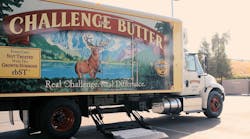COMPANY: Challenge Dairy Products, Inc., Dublin, CA
OPERATION: Wholly-owned subsidiary of California Dairies Inc. is the second-largest U.S. dairy cooperative marketing and distributing dairy products from 400 large family-owned dairies through eight distribution centers. A food manufacturer and distributor with more than 175 employees, Challenge Dairy offers products such as butter, cheeses, milk, eggs, ice cream, mayonnaise, and more.
CHALLENGE: Find an environmentally cleaner, cost-effective alternative to diesel-powered refrigerated trucks.
Challenge Dairy considers itself a pioneer in the dairy industry. It has a history of manufacturing and procedural innovations such as introducing the world's first successful metal butter churn and being the first to ban the use of growth hormones. The company saw a big problem with transport refrigeration units (TRUs) used to transport groceries, produce, dairy items, and many other food products to locations throughout U.S. communities.
Conventional TRUs are generally powered by small diesel engines that produce 10 times greater NOx emissions and 20 times greater particulate matter emissions per gallon of diesel fuel burned compared with chassis engines of today's heavy-duty vehicles.
Businesses, residents, and industry partners throughout California's San Joaquin Valley have invested more than $40 billion in reducing air pollution by more than 85%. "Our company is deeply vested in the valley where our dairy farmers reside and where locals help to make our butter and cream cheese in our facilities," said Tim Anderson, senior vice president of food service and retail at Challenge Dairy.
Fresno County, CA alone in the San Joaquin Valley is home to 1.88 million acres of the world's most productive farmland. So Challenge Dairy sought a more environmentally friendly, sustainable way to transport produce and dairy products that might offer some other benefits besides.
SOLUTION: Implement Rayfrigeration technology from eNow into the fleet.
Challenge Dairy became the first to test out an 1,800-watt solar-powered Rayfrigeration unit from eNow. The San Joaquin Valley Air Pollution Control District funded the initiative through its Technology Advancement Program, which encourages innovation through emission-reduction technologies.
Challenge Dairy had one of its food service distribution trucks with a Johnson refrigerated body equipped with eNow's Rayfrigeration setup. The technology uses cold plates and a lightweight battery system developed by Emerson, and batteries are charged by solar and utility power.
Trucks can be plugged in overnight to charge, while roof-mounted solar photovoltaic panels provide electrical power to the TRU in daylight hours whether delivering product or parked at the depot. The truck's electrical system can also charge the system's batteries while the vehicle engine is operating as a backup option.
"The back of this truck is every bit as cold as a diesel," said Tom Ditto, vice president of food service at Challenge Dairy. The company has been testing the solar-powered TRU since April 2017 and has seen emission reductions of 98% in NOx, 86% in CO2, and 97% in particulate matter.
Beyond the environmental benefits, importantly, fleets can see reduced costs from the system as well. eNow describes its solar-powered reefer units as "powerful, reliable, and highly cost-effective," projecting that it can cut typical operating costs by as much as 90% through lower fuel and maintenance costs and extended battery life.
Though Challenge Dairy tested the solar-supported reefer system on a straight truck with a shorter trailer, eNow has calculated that with a 53-ft. refrigerated trailer, its system uses about 20% as much in electricity expenses compared with fuel costs and racks up about 33% as much in maintenance cost as a diesel-powered unit would.
Over time, that can mean thousands of dollars of savings per truck as well as a much cleaner-running refrigerated truck fleet. After completing a 12-month test period, Challenge Dairy began transitioning its fleet of distribution trucks from diesel to solar-powered TRUs.



